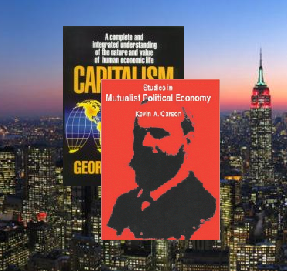[cross-posted at Liberty & Power]
Mine, that is. There’ll also be a round of responses and counter-responses over the next week or so (the “Cato Unbound” format).
 Here’s Cato’s summary of my essay:
Here’s Cato’s summary of my essay:
In this month’s lead essay, philosopher and libertarian theorist Roderick Long draws a sharp contrast between corporatism and libertarianism properly understood. He argues that liberals, conservatives, and even libertarians have all been guilty to some degree of obscuring this difference, and that the quality of our political discourse has suffered accordingly. He suggests that libertarians should guard themselves against falling into the trap of “vulgar libertarianism,” in which all things good spring from business, and particularly from business as usual. Corporations, he argues, should be no more free of scrutiny than any other institution in a free society, and often businesses have done more than their share to hamper free economic relations in the industrialized world.
One implication of all of this is that the truly free market is farther away than we imagine. Long suggests several ways in which a freed market might look different from what we see around us today. Notably, nearly all of these differences are to the benefit of the consumer and the small or start-up business. These likely outcomes of laissez faire suggest new grounds for left-liberals and libertarians to revise their thinking on economic issues and on politics more generally.
And here’s Cato’s introduction to the whole exchange:
This issue tackles a grave misconception: the idea that corporations and markets are synonymous, and that what’s good for the one is good for the other.
Astute economists have noted that far too often, corporations act to restrict the free operation of the market. Corporations that have become successful in a free or quasi-free market don’t like to face competition any more than any other entity, and their success gives them the resources, unfortunately, to stifle would-be competitors. In these cases, corporations and governments can often find themselves in an unholy alliance against consumers, other firms, and liberty itself. Corporatism, in other words – a system that seems to value corporations as an end in themselves.
And after that – what’s an advocate of the free market to do?
 In this month’s lead essay, philosopher and libertarian theorist Roderick Long examines the often tangled relationship between governments, corporations, and those who argue both for and against laissez-faire capitalism. Is a truly libertarian politics possible? Or do libertarians always run the risk – despite their best intentions – of sounding like, or acting like, apologists for an alliance between the state and corporations?
In this month’s lead essay, philosopher and libertarian theorist Roderick Long examines the often tangled relationship between governments, corporations, and those who argue both for and against laissez-faire capitalism. Is a truly libertarian politics possible? Or do libertarians always run the risk – despite their best intentions – of sounding like, or acting like, apologists for an alliance between the state and corporations?
In the rest of the issue, we will hear from three authors with different takes on corporatism and its relationship to free-market advocacy. Political analyst Matthew Yglesias has expressed skepticism about libertarian and free-market advocacy in the past, owing to corporate entanglements. Economist Steven Horwitz has argued that many of our current economic troubles owe precisely to corporate entanglements with the state, and has urged liberals and libertarians to recognize the many potential points of agreement they might find on these issues. And economist Dean Baker has criticized what he refers to as the “conservative nanny state,” or the ways in which the wealthy use their resources to harness government power to their own advantage. Be sure to stop by through the week as our contributors debate these very important issues for the future of a free economy.
Needless to say, I’m excited to have such a prominent forum for the promotion of the cause, and I’m particularly happy to express my gratitude to Jason Kuznicki for offering me this opportunity, as well as to my various left-libertarian comrades on whose ideas I have freely drawn in my essay. Our quest for world domination continues ….
I got a giggle out of Keith Olbermann’s claim (conical hat tip to Lew Rockwell) that he refrains from voting in order to maintain his objectivity and neutrality – as though Olbermann’s relentless attacks (70% laudable and on target, 30% barking mad) on the Republicans haven’t provided far more help to the Democrats than his periodically marking a box or pulling a lever could possibly do. What is this mystique about the magical power of the ballot – which is actually one of the least effective forms of political action for an individual?